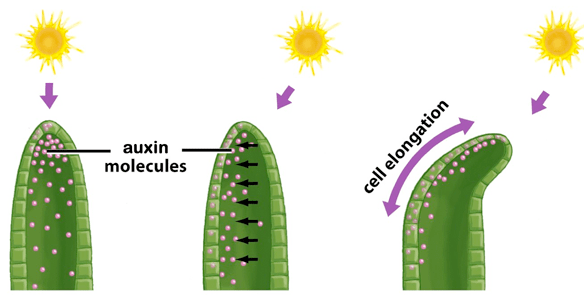
Plant hormones are chemical messengers which plays a vital role in controlling the entire life process and other activities in the plant cell-like seed germination, ripening of the fruit, growth, flowering, etc.
There are four major types of plant hormones (or phytohormones) which are involved in the control and coordination in plants. These are:
Production of plant growth hormone is affected by drought, nutrients, temperature, light, and stress are the environmental factors.
Out of these, auxins, gibberellins and cytokinins are the plant hormones which promote growth of plants, while abscisic acid is a plant hormone which inhibits (or prevents) the growth.
Auxin

Gibberellins:
Cytokinins:
Abscisic acid:
Ethylene: